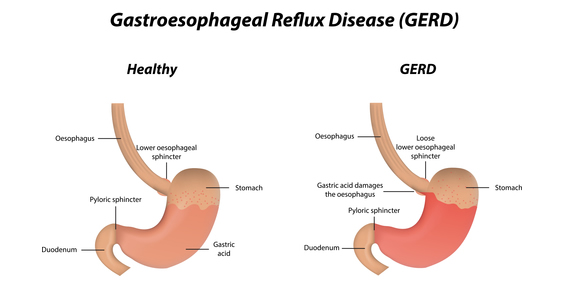The typical symptoms of this are heartburn and regurgitation, but it can also present with pain on swallowing, chest pain or nausea. It is important to check particularly in older patients that there is no risk of progression to cancer by endoscopy. Although most patients respond to proton pump inhibitors increasingly there are patients who do not respond to them. In these patients further investigation with pH recording which is offered at Shirley Oaks is useful.

Other groups of patients particularly those with a lot of regurgitation and choking will benefit from surgery by laparoscopic fundoplication. The initial investigation and assessment of suitability can be assessed at Shirley Oaks and appropriate referral arranged.
Acid reflux is a very common problem, but it can have a big impact on your life. If you experience the symptoms of acid reflux frequently then it’s important to see a doctor, especially if it’s making you feel stressed or interfering with your life too.
Common Symptoms of Acid Reflux
The main effect of acid reflux is the sensation known as heartburn. It feels like a burning or stinging pain in the centre of your chest. The pain occurs when acid escapes from your stomach and comes in contact with the throat lining.
Heartburn is an obvious sign of acid reflux, but this common condition can also have some other effects that may be less easy to recognise. Many people are unaware that these symptoms are caused by reflux.
You might also experience:
Acid reflux symptoms usually get worse just after you’ve eaten, especially if you’ve had a big meal. It can also be easier for the acid to get into your throat when you are lying down or if you bend over, so this can make your symptoms worse.
Other Effects of Acid Reflux
The physical symptoms of acid reflux aren’t the only way that this common digestive problem can affect you. Living with acid reflux can actually have a big impact on you. It could make it harder to do the things that you enjoy or make you feel self-conscious and stressed.
Some possible effects of acid reflux include:
Acid Reflux and Throat Cancer
Acid reflux isn’t usually a sign of anything serious, although there may be an underlying condition that requires treatment. However, it is important to be aware of the impact that frequent reflux can have on your body. When stomach acid is coming into contact with your throat lining, it can cause a condition known as Barrett’s oesophagus.
Barrett’s oesophagus happens when the cells lining your throat begin to grow abnormally because they have been damaged so often by the stomach acid. The cells will look much redder than usual when the doctor examines your throat during endoscopy.
The changes can increase the chances of developing throat cancer. Most people who have acid reflux won’t develop cancer, even if they do have Barrett’s oesophagus. However, you are more likely to be affected.
You can reduce the risk of Barrett’s oesophagus by getting treatment to relieve your acid reflux. You should also get regular check-ups if you do develop Barrett’s oesophagus so that any developing issues can be spotted and treated quickly.
When to See a Doctor About Acid Reflux
You shouldn’t ignore acid reflux if it’s happening often or having a big impact on your quality of life. It’s important to see a doctor so that you can get help managing your symptoms. The doctor will also be able to check for any underlying health issues that may need to be treated. You can also be monitored for Barrett’s oesophagus if necessary.
If you want to talk to an experienced doctor about acid reflux then you should make an appointment with Mr Mike Mendall in London.
Acid reflux is a very common problem, but the good news is that it is often easy to solve. You can often prevent heartburn by making some simple changes to your diet and lifestyle. However, your doctor might recommend some additional treatment if this doesn’t help or if there is an underlying condition that is causing your reflux.
Changing the Way You Eat
Acid reflux happens when some of the acid from your stomach escapes up into your throat. The burning pain in the middle of your chest that is known as heartburn is caused by the acid encountering your throat lining. The symptoms of acid reflux often appear soon after you have eaten as this is when your stomach is fullest and most active. You’re producing lots of acid to break down your meal, but there is also less room in your stomach because of all the food. Problems are more likely to happen if you’re eating certain kinds of food or if you overeat.
Changing the way that you eat is the easiest way to avoid acid reflux.
Other Lifestyle Changes
Changing your eating habits can make a big difference to acid reflux, but other aspects of your lifestyle can be important too. You might want to try the following tips to prevent heartburn:
Medication
A number of different medications can help to treat or prevent acid reflux:
Surgical Treatments for Acid Reflux
If there is an underlying medical cause for your acid reflux then your doctor may recommend surgery to treat it. Surgery can help if you have a problem such as a hiatus hernia or an issue with the valve that should hold the top of the stomach closed. However, your doctor will usually want to try lifestyle changes and medication first.
If you need advice on treating acid reflux then you can make an appointment with Mr Mike Mendall in London.